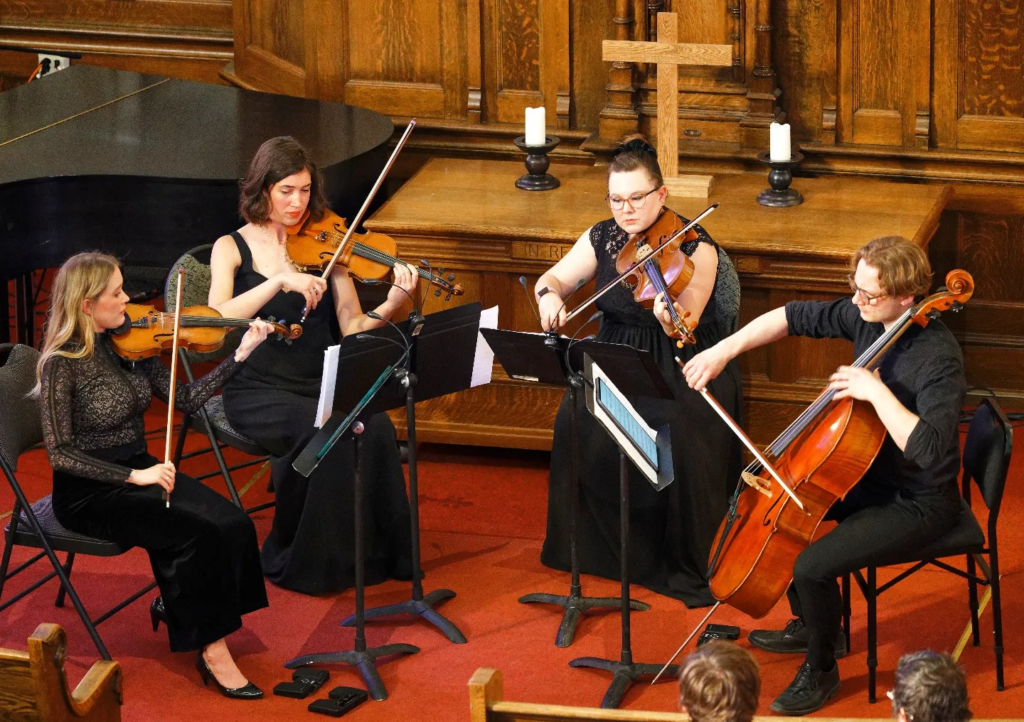
Review by Mark Morris
Britten: Alla Marcia [1]
Shostakovich: String Quartet No.8 in C minor, Op.110 [2]
Mendelssohn: String Octet in E-flat major, Op.20
[1] Vaughan String Quartet
Vladimir Rufino (violin)
Mattia Berrini (violin)
Fabiola Amorim (viola)
Silvia Buttiglione (cello)
[2] Vertex String Quartet
Christina Barry (violin)
Lydia Metzger (violin)
Jenna Gensler (viola)
Conrad Sobieraj (cello)
Holy Trinity Anglican Church, Edmonton
December 2, 2023
To celebrate their tenth anniversary, Edmonton’s Vaughan String Quartet has been presenting a series of concerts with fellow musicians, spread out over the last few months, in Holy Trinity Anglican Church.
Their December 2 concert was the last in this series, and for it they teamed up with an Edmonton string quartet I had not heard before, the Vertex String Quartet. Formed in 2016, they are no strangers to collaborations, recently recording tracks for an upcoming album by Rare Americans, the Canadian-Slovak alternative rock band based in Vancouver, and collaborating with the jazz band Good Information at the Edmonton Jazz Festival. This concert marked a farewell for cellist Conrad Sobieraj, who is leaving the Quartet.
The concert opened with the Vaughan playing a short early Britten piece, Alla Marcia. This was originally written in 1933, first for an abortive suite for quartet inspired by a German film, before appearing in a revised version as the opening of a series of movements for quartet, Alla Quartetto Serioso, subtitled ‘Go play, boy, play’, and describing childhood. Its material was then incorporated into ‘Parade’, the eighth song in Les Illuminations (1939).
The Vaughan gave it in its original incarnation, and what is extraordinary about the four-minute piece is how much, after the English folksong start, it sounds like Shostakovich. The two composers were, of course, close friends (The Prodigal Son was dedicated to Shostakovich, and the Russian composer visited Britten at Aldeburgh in 1972), but Britten had not heard any of the Soviet composer’s music when Alla Marcia was written. Its slightly sardonic undercurrent of what is less a march and more a forced walk, and its plucked strings and offset chords under a solo violin, are pure Shostakovich hallmarks.
It made for an arresting opening to the concert, and an apposite prelude to the main work in the first half, Shostakovich’s String Quartet No 8 in C minor, Op.110. Written in three days in Dresden in 1960 when Shostakovich was working on a film about the horrific bombing of Dresden in World War II, it has become perhaps the best-known of Shostakovich’s 15 quartets.
He dedicated it to ‘the memory of the victims of fascism and war’, and in the West the long drone at the opening of the five linked movements was long thought to represent the bombers travelling towards Dresden. However, that drone underlies the D-S-C-H motif (Dimitri Shostakovich) that pervades the quartet (D-S-C-H being the German notation for D, E flat, C and B natural), and we now know that the composer was in a deep depression when composing the quartet, and identified himself with those victims, as a victim of the Soviet state.
That personal musical signature, and the quotes from Shostakovich’s earlier works (from the Symphony No. 1, the Symphony No.5, the Piano Trio No.2, and the banned opera Lady Macbeth of Mtsenk ) seem to confirm the autobiographical intent, but at the same time the quartet does have the feel of the horrors of war, and indeed the furious outbreak of the second movement recalls his war-time Symphony No.8, which is also in the key of C minor.
It is a passionate, harrowing work, almost symphonic in scale, that requires not only great precision – perhaps incision would be a better word – from the performers, but also an immersion into its horrific and often angry expression. It is also a brave work for a young quartet to tackle, and I did wonder how it would fare in the hands of the Vertex quartet.
The answer was an accomplished and expressive performance, capturing both the extreme dynamics and the emotion of the work. There were most effective touches throughout, such as the little detail of the mini-trills from second violin Lydia Metzger, some lovely high playing from Sobieraj in the first largo section (measure 62 onwards in the score), and conversely the rich tone of Christina Barry as the violin writing goes low at the start of the final Largo. The mercurial and angry Allegro, and the chordal interruptions in the first Largo, could have been even more incisive, but that is something that will come through repeated performance, and this one was rightly appreciated by the enthusiastic audience.

The joy of having two string quartets on stage is the opportunity to hear Mendelssohn’s String Octet in E-flat major, Op. 20, one of his best loved works. It was written in 1825 when he was only 16, and was one of the first works to employ such forces. Like so much of Mendelssohn’s music, it is pretty sunny in disposition, and Mendelssohn himself suggested: “This Octet must be played by all the instruments in symphonic orchestral style.”
This the combined Vaughan and Vertex String Quartets took to heart, with a kind of classical equivalent to the ‘Wall of Sound’ in the first movement, going for drama rather than warmth. Perhaps individual instrumental passages could have been placed a little more forward in the balance, but the rapport between the players, especially violists Fabiola Amorim and Jenna Gensler, was a joy to both see and hear.
If the rocking idea from the violas and cellos in the Andante, foreshadowing Mendelssohn’s Hebrides Overture, got rather lost against the upper strings, the final Presto movement was wonderfully heady, full-toned, and with a sense of the hunting trip – music for the fox-hunt, so to speak, with hounds sniffing around and then dashing off, following the scent again.
It was a mellow way to end the Vaughan’s tenth anniversary, and one that so amply showed the joy of such music making, a pleasure for both players and audience.
The Vaughan String Quartet are playing in Yellowknife (December 7 – 9), and the next scheduled public appearance of the Vertex Quartet is on May 5, 2024, in a concert for the St. Albert Chamber Music Society, where they will be playing with their new cellist, Melissa Lank. I do hope we will get more regular opportunities to hear them in Edmonton.
Vaughan String Quartet
website
Vertex String Quartet
Facebook site

